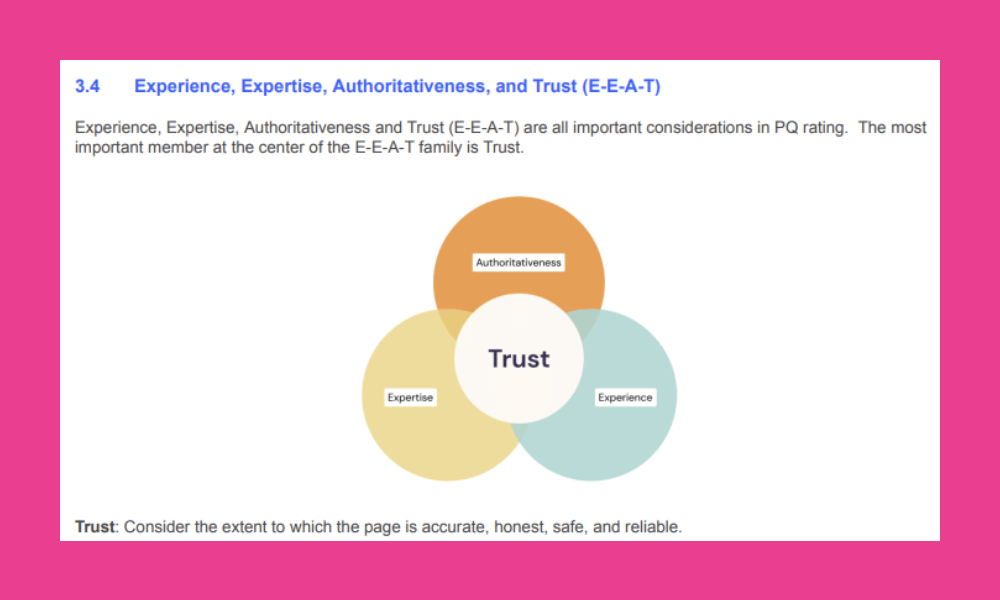In the constantly changing world of SEO, the discussion around Google’s E-E-A-T (Experience, Expertise, Authoritativeness, Trustworthiness) as a ranking factor is a hot topic of debate. Some argue its direct impact on search engine rankings, while others suggest its influence is more nuanced and subtle.
However, one thing remains clear. In the traditional sense, e-E-A-T may not function as a standalone ranking factor but rather as a collection of vital elements that, in combination, shape a website’s position in search results and how you appear on them.
Essentially, you are indeed what (or how) you E-E-A-T.
What is E-E-A-T?
E-E-A-T, stands for Experience, Expertise, Authoritativeness, and Trustworthiness.
E-E-A-T is not a direct factor in Google’s search algorithm. Instead, it’s a key aspect outlined in Google’s Search Quality Rater Guidelines. These directives serve as the guide for Quality Raters, individuals tasked with evaluating the quality of search results.
In simpler terms, search quality guidelines are the rulebook for Google’s quality evaluators. These people (yes – not bots!) assess the expertise and trustworthiness of content appearing in the SERP (Search Engine Results Page). They ensure Google delivers accurate, reliable and high-quality search results to its users.
Experience, Expertise, Authoritativeness and Trust
According to Google,
“Trust is the most important member of the E-E-A-T family because untrustworthy pages have low E-E-A-T no matter how Experienced, Expert, or Authoritative they may seem. For example, a financial scam is untrustworthy, even if the content creator is a highly experienced and expert scammer who is considered the go-to on running scams!”

Google quality raters guidelines on E-E-A-T
Experience (E)
Experience in E-E-A-T refers to the firsthand knowledge of the subject matter expert Google rewards content produced by individuals or organisations with genuine experience in their fields. This ensures that the information provided is accurate, relevant, and reliable.
Expertise (E)
Expertise is based on the knowledge possessed by the writer. It reflects their authority on a particular topic. Google rewards content that demonstrates expertise through analysis, detailed insights, and authoritative references. Google has recently confirmed that high-quality content is crawled more often.
Authoritativeness (A)
Authoritativeness is about the creator’s reputation and credibility. It comprises factors such as peer recognition, endorsements from reputable sources, and a track record of producing high-quality, reliable, and helpful content.
The March 2024 Core update, in particular, has been rolled out with the aim of removing at least 40% of unhelpful, low-quality content. This aligns with the various ‘helpful content updates’ Google has rolled out over the last few years.
Trustworthiness (T)
Trustworthiness is definitely the main factor in Google’s page quality assessment. Google will consider reliability, accuracy, transparency and whether you answer your customers’ search queries honestly.
Trustworthy content is more likely to rank higher in search results and attract a larger audience. Google prioritises content that meets users’ expectations regarding accuracy and reliability.
How to improve your website with E-A-A-T
In this blog, we’ve covered the foundational elements of E-E-A-T and its importance to SEO. In the second part of this blog series, we’ll outline actionable strategies for implementing E-E-A-T to enhance your website’s visibility on the SERPs. We will also show how it can boost brand awareness and credibility with your target audience.
If you want to enhance your website’s E-E-A-T through SEO, technical optimisations or blog writing, our expert team can help. We specialise in tailored SEO strategies that align with Google’s algorithms no matter how often they change or update it!



